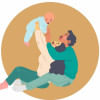Signs of depression in children

Being a child is not easy in today's world. Ridden with temptations and demands, children, from a very early age, can and do suffer from depression and while treatable, it is important to recognise the symptoms of the sneaky illness before it has the chance to overwhelm them.
Children, at every age, are trying to navigate emotions bigger than themselves and it is not unusual for them to feel down and washed out from time to time. However, when the feeling is very intense and continues for a long time, particularly in a way that impacts a child's social, family or school life, it may be worth probing into.
Depression can be both mild and short-lived or severe and prolonged. It may hit people once or more than once, depending on a wide range of factors. The disease often develops alongside anxiety and can be a result of abuse, the impact of the death of a close person, domestic violence, family breakdown or violence or bullying at school, among other reasons. The ailment can also be genetic.
Some common physical signs of depression in children include: unexplained lethargy or tiredness, restlessness and a lack of focus, difficulty in carrying out daily activities, changes in appetite and sleep patterns and aches and pains without any obvious reason. Emotional and mental symptoms include persistent sadness, anxiousness and or irritability, a loss of interest in friends and regular activities they enjoy, moving away from others and wanting to be alone, harbouring feelings of worthlessness, hopelessness or guilt, taking unnecessary risks that they would usually steer clear of and having self-harming or suicidal thoughts. It is not necessary for a child with one or more of these symptoms to be going through depression. However, when in doubt, it is best to offer them support and have a professional mental health expert take a look as soon as possible.
There are a number of ways to help a child struggling with mental health issues. One of them is to try and find out what is actually happening to them. This means asking them how they are feeling from time to time and to be as open-minded and non-judgemental as possible, when listening to their problems. An interesting way to allow them to express themselves freely can also be through artistic expression such as painting, crafts, or mood-journaling.
Another way to make a child feel better is to spend time with them, and doing the things they enjoy. This can build feelings of warmth and reassure a child that their guardian is invested in their life. Encouraging positive habits such as steady sleep and daily routine, physical activity and calming or rejuvenating music can help children feel better about their lives. Finally, it is important to protect children from stressful surroundings, especially where they may face maltreatment or increased anxiety. It is also wise to model healthy behaviours and boundaries in front of children so that they can observe and learn.

 For all latest news, follow The Daily Star's Google News channel.
For all latest news, follow The Daily Star's Google News channel. 








Comments